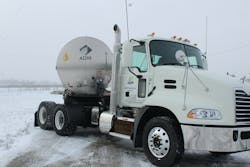Biodiesel System Helps Diesel Trucks Beat Low Temps
February brought record cold temperatures to the entire country, and the wide-open prairies of Central Illinois were no exception.
The common misconception about biodiesel is that cold weather limits performance, but in fact temperatures plunging as low as negative 10 F were no trouble for a fleet of Archer Daniels Midland (ADM) trucks that ran more than 23,500 trouble-free miles on sustainable B100 biodiesel that month.
The trucks are part of a cooperative pilot program, announced last year, to demonstrate the viability of Optimus Technologies’ Vector System. While nearly all diesel engine manufacturers support at least 20 percent biodiesel (B20), the Optimus Vector System is designed to allow conventional diesel engines to run on 100 percent biodiesel in a wide range of climates.
“Protecting our planet and its natural resources is core to our purpose as an organization,” said Steve Finn, ADM’s vice president for trucking. “ADM’s value chain stretches from the farm field all the way to the food we put on the table and the fuel we put in our vehicles, and we look at every single step of that value chain as an opportunity for innovative practices and solutions.
“This pilot, using ADM trucks and ADM-produced biodiesel, has the potential to validate technology that could dramatically increase the use of environmentally friendly biodiesel across the trucking industry,” Finn said. “We’re excited to be part of this project, and we’re proud to see the technology proving itself–including in the recent extreme weather, during which temperatures dropped as low as negative 10 F, and we saw four consecutive days that never got above 10 degrees.”
Five trucks owned by ADM and outfitted with the system are being used in daily fleet operations, with each vehicle anticipated to travel 160,000 to 180,000 miles and reduce up to 500,000 pounds of CO2. All biodiesel used in the project comes from ADM’s refinery in Mexico, Missouri.
The pilot project is supported by ADM, Optimus, the American Lung Association, the National Biodiesel Board, the Illinois Soybean Association, and the Missouri Soybean Merchandising Council.
Since 2003, vehicles powered by biodiesel have logged billions of problem-free miles, the company says.
Biodiesel blends up to B20 should be treated just like petroleum diesel fuel by using cold-weather additives recommended by your fuel supplier, while B100 should be paired with technology such as The Vector System when operating in colder climates.
